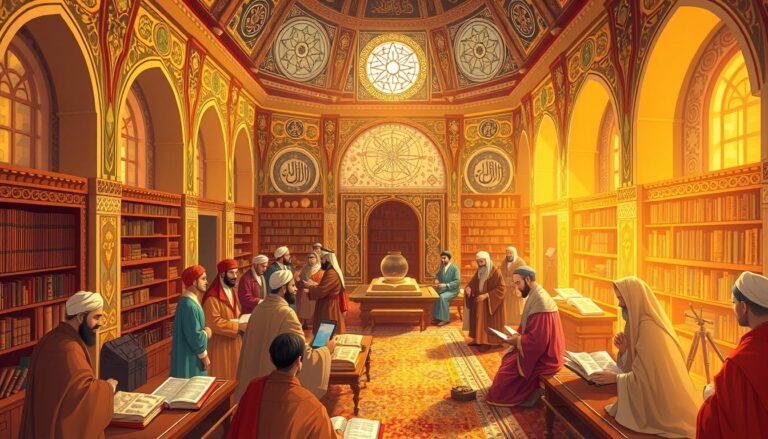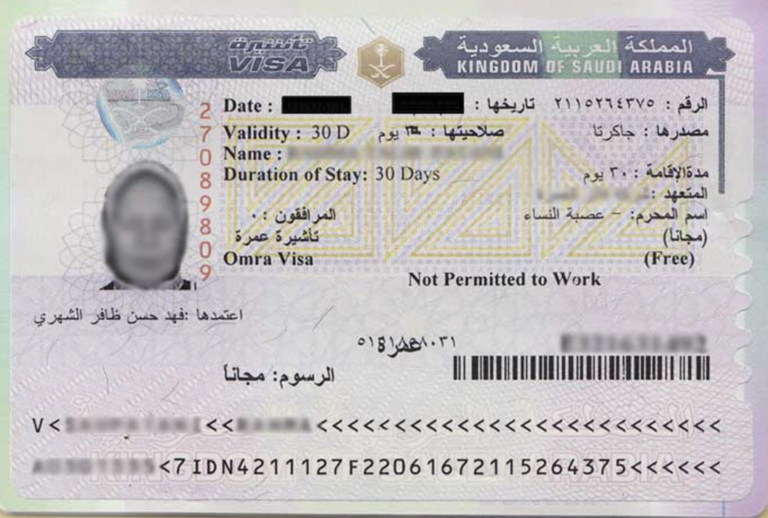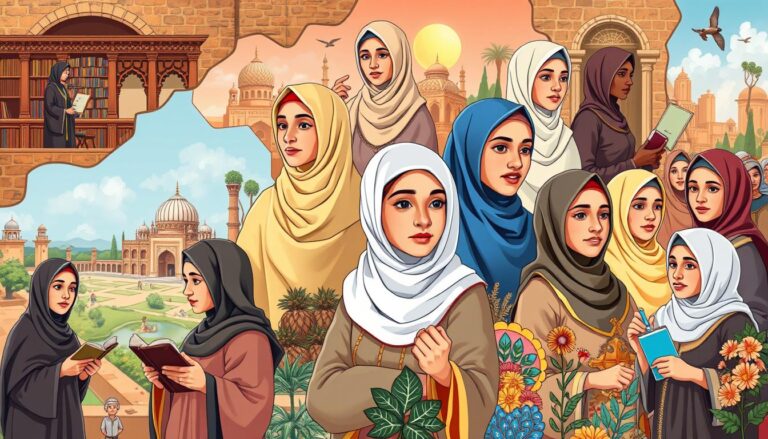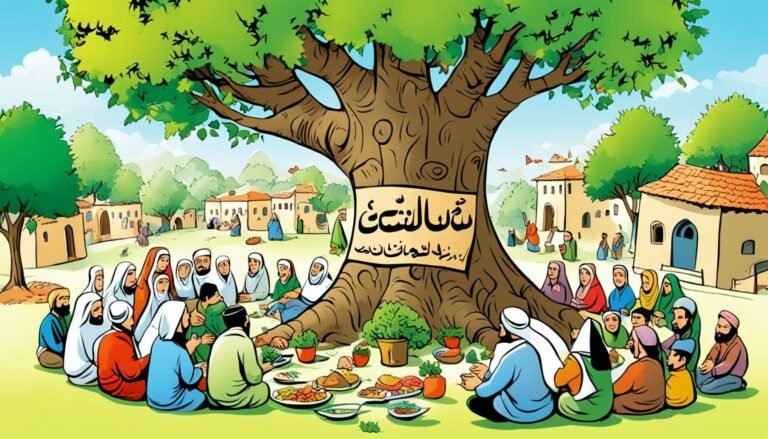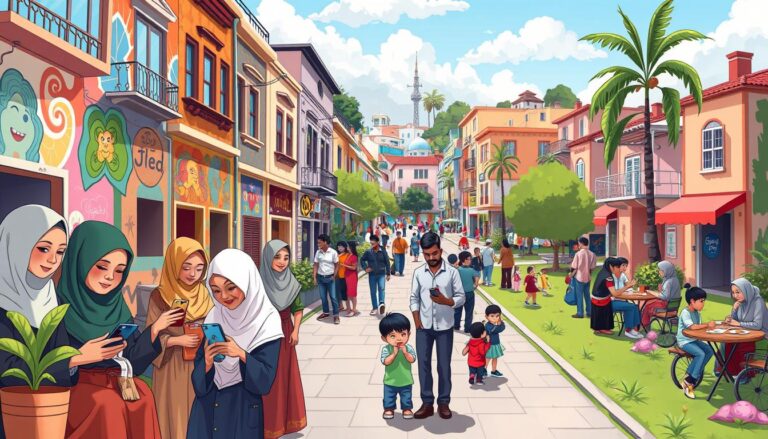Justice in Islam: Lessons for a Better World
Can a 1400-year-old faith offer solutions to today’s complex social issues? The Islamic principles of justice, deeply rooted in Quranic teachings, provide timeless wisdom. These principles offer valuable lessons for building a better world, addressing everything from economic inequality to minority rights.
The Quran emphasizes justice as a core value, with over 200 verses dedicated to admonishing injustice and oppression. This focus underscores the religion’s commitment to fairness and equality in all aspects of life. From the balanced approach of early Islamic scholars like al-‘Iṣfahānī to the practical applications in modern legal systems, Islamic justice offers a comprehensive framework for societal harmony.
In Islamic thought, justice isn’t just about punishing wrongdoers. It’s about creating a society where everyone has equal opportunities and where the vulnerable are protected. This holistic view of justice extends to economic matters, minority rights, and even environmental stewardship. By exploring these principles, we can gain insights into building more equitable and sustainable communities.
Key Takeaways
- Islamic justice is rooted in over 200 Quranic verses
- Justice in Islam encompasses social, economic, and legal aspects
- The Quran uses various terms to describe justice and injustice
- Islamic principles offer solutions for contemporary social issues
- Justice in Islam balances punishment with protection of the vulnerable
- Islamic teachings on justice can inform modern legal frameworks
Understanding the Concept of Justice in Islam
Justice is at the heart of Islamic teachings, guiding followers to a righteous path. The Quran teaches about social justice, focusing on fairness and moral rightness. These teachings shape Islamic law and human rights, aiming for a just society.
The Quranic Perspective on Justice
The Quran highlights justice’s importance in Islam. It outlines rules for a successful life, promoting fairness and protecting rights. Allah instructs us to return trusts to their owners and to judge fairly in all situations.
Justice as a Core Islamic Value
Islamic justice calls for supporting the oppressed and helping the needy. The Quran teaches Muslims to stand for justice, even when it’s hard. This is shown in Surah Nisa, where truth is valued above all.
The Balance Between Mercy and Justice
In Islamic justice, mercy and fairness go together. The Prophet Muhammad taught the value of mercy alongside justice. This balance is seen in Islamic law and human rights, aiming for a society that is both just and kind.
“Whoever is kind, Allah will be kind to him; therefore be kind to man on the earth. He Who is in heaven will show mercy on you.” – Ṣaḥīḥ Abu Dawud
Muslims aim to create a world where justice and human dignity are respected. They strive to apply these principles to build a fair society.
The Foundations of Islamic Justice
Islamic principles of justice are key to a fair society. They are based on tawhid, which shows God’s unity and human equality. The Qur’an says everyone, no matter their background, deserves equal respect.
Equality and fairness in Islam are not just for personal interactions. They apply to governance, social life, and economics too. The Holy Prophet of Islam said, “A moment of justice is better than seventy years of worship.”
Islamic ethics and moral values are vital for just societies. The Qur’an (5:32) teaches that saving one life is like saving all humanity. This shows how much Islam values justice and human dignity.
“Whoever kills a human being, except as a punishment for murder or other villainy in the land, shall be looked upon as though he had killed all mankind; and whoever saves a human life shall be regarded as though he had saved all mankind”
The idea of mizan, or balance, is key to Islamic justice. It aims for balance in life, from personal actions to societal structures. This helps Muslims build fair communities that respect everyone’s rights.
- Justice as the essence of societal welfare
- Equal treatment regardless of race, gender, or social status
- Balance (mizan) in personal and social life
By following these principles, Islamic societies aim to create a more just world for everyone.
Justice in Islam: Lessons for a Better World
Islamic teachings on justice offer insights for today’s global problems. They guide us in creating a fair and equal society. This is done through social responsibility and ensuring resources are shared fairly.
Applying Islamic Principles to Contemporary Issues
Islam teaches that everyone is equal under the law. This idea helps tackle issues like wealth gaps and discrimination. The Qur’an urges us to treat everyone with fairness, no matter their background or status.
Building a Just Society Based on Islamic Teachings
Islamic ethics value honesty, integrity, and respect for all. These values can make our world more compassionate. Muslims are urged to fight for justice, even if it’s hard.
This mindset encourages a society that fights against unfairness and supports equality.
The Global Impact of Islamic Justice
Islamic justice’s lessons are not just for Muslims. They promote caring for the environment and ethical economics. These teachings can help unite cultures and nations.
“The Prophets of Allah were tasked with instituting social justice, including actions such as inviting people towards worshipping Allah, providing warnings and guidance, teaching and imparting instructions, and opposing oppressive laws.”
By applying these principles worldwide, we can strive for a more just and peaceful world. This is true for everyone, regardless of their faith or background.
Equality and Fairness in Islamic Jurisprudence
Islamic law bases its system on equality and fairness. The Quran teaches that justice is key, urging Muslims to treat everyone equally. This belief in equality and fairness is seen in all parts of life, from legal cases to social interactions.
Islamic law and human rights are closely linked. The Quran (4:93) says killing believers is wrong, showing the value of human life. It also protects non-Muslims, as shown in hadith from al-Bukhari and Abu Dawud. The Quran (2:188) bans getting wealth illegally, promoting economic fairness.
Islamic ethics and moral values are key to a fair society. The Quran (49:11-12) stops defamation and spying, protecting privacy and dignity. The Prophet’s Farewell Hajj address also stressed respecting others’ honor and chastity.
- Muslims believe justice is a supreme value in Islam
- Equality applies regardless of gender, race, or nationality
- Rewards in Islam are based on piety and righteous deeds
- Islamic law protects the rights of both Muslims and non-Muslims
In Islamic law, qisas (equitable retribution) ensures justice without bias. This system assumes innocence until proven guilty, mirroring modern fair trial standards.
“Allah does not look at your forms or wealth, but He looks at your hearts and deeds.”
Islamic law values inner qualities and actions over looks. This approach helps create a society where everyone is treated fairly. It teaches us valuable lessons for a more just world.
The Role of Justice in Islamic Governance
Islamic governance values justice highly. The term “al-‘Adalah” or “al-‘Adl” in Arabic is at its core. It guides leaders in creating a fair and equal society.
Historical Examples of Just Islamic Rulers
Islamic history shows many just rulers. Caliph Umar ibn Abdul Aziz is a great example. His rule was known for fairness and equality, showing justice in action.
Responsibilities of Leaders in Upholding Justice
Islamic teachings say leaders must uphold justice. The Quran tells believers to stand for fairness, even when it’s hard. This is key in Islamic governance, where leaders put people’s welfare first.
Accountability in Islamic Leadership
Accountability is crucial in Islamic leadership. The concept of shura (consultation) makes leaders answer for their actions. Islamic ethics say rulers will be judged for their actions in the afterlife, encouraging moral responsibility.
“Justice is the bond that holds society together and transforms it into a unified brotherhood.”
Islamic governance aims for a society where justice rules. This approach, based on Islamic ethics, teaches valuable lessons for today’s world. It helps build societies that are just and fair.
Social Justice and Economic Equality in Islam
Islam emphasizes building a fair and equal society. It teaches justice and equality, not just for Muslims but for everyone. This shows Islam’s commitment to fairness for all.
The Quran talks a lot about justice and equality. It tells believers to return what’s owed to others and treat everyone fairly. This is the base of Islamic justice, which includes equal rights and fair wealth sharing.
- Freedom of conscience
- Equality among individuals
- Social interdependence
In Islam, helping those in need is key. Zakat, giving 2.5% of wealth to the poor, is a big part of this. It helps spread wealth and fights poverty.
Islamic history is full of examples of justice and equality. The Prophet Mohammed and his followers always acted with fairness. Their example teaches us the value of fairness in life.
“The best of people are those who benefit others.”
In Islam, social justice sees everyone’s unique gifts and challenges. It understands that people are different in many ways. This means equality isn’t about treating everyone the same. It’s about giving everyone what they need based on their situation.
Islamic Principles of Justice for Minorities and Vulnerable Groups
Islam values justice for all, especially minorities and those who are vulnerable. The Quran and teachings of Prophet Muhammad guide us towards equality and fairness. They aim to build a society where everyone is treated with dignity and respect, no matter their background.
Protection of Minority Rights in Islamic Law
Islamic law and human rights are closely linked in protecting minorities. The Quran says, “Allah commands justice, doing good, and liberality” (16:90). This verse shows how important it is to treat everyone fairly, including minority groups.
Islamic Teachings on Caring for the Vulnerable
Islam teaches us to care for the vulnerable. Prophet Muhammad believed in showing mercy to others. He said, “People are as equal as the teeth of a comb,” showing that everyone is equal in Islam. This encourages Muslims to help those in need, no matter their social status.
Combating Discrimination through Islamic Justice
Islamic principles strongly reject discrimination. The Prophet’s Farewell Sermon stressed the importance of respecting lives and property, regardless of race or ethnicity. He taught that equality comes from piety and good actions, not worldly differences. These teachings help fight discrimination and ensure justice for all in Islamic societies.
- Muslims are encouraged to engage in community projects
- Islamic civilization established waqf system to support those in need
- Personal change is seen as a catalyst for broader societal justice
By following these principles, Islamic societies aim to make justice for minorities and vulnerable groups a reality, not just an ideal.
Restorative Justice in Islamic Tradition
Islamic justice focuses on fixing harm and making things right. It’s about helping offenders change and victims heal. This idea is becoming popular in modern justice systems.
In Islamic law, crimes are divided into three types. Qisas crimes let victims play a big role in justice. They can choose to forgive, ask for compensation, or seek revenge.
The idea of “Al-Adl” in Islam is about fairness in justice. It balances punishment with kindness. This idea is close to restorative justice’s goals of helping victims and stopping crime.
“Compassion and mercy in Islamic justice are not signs of weakness, but of strength and wisdom.”
Islam teaches about changing and making amends. This is similar to modern rehab. It aims to keep people from committing crimes again. Countries like the USA and Canada have started using restorative justice since the 1970s.
The Islamic view on justice teaches us important lessons. It’s a kinder, cheaper, and more effective way to solve problems. It could lead to better results for everyone involved.
The Intersection of Islamic Ethics and Justice
Islamic ethics and moral values are key to justice in Islam. They guide Muslims in creating a fair and equal society. Justice in Islam is more than just laws; it’s a complete approach that looks at actions and intentions.
Islamic justice values fairness and equality. The Quran says:
“O you who believe! Stand out firmly for justice, as witnesses to Allah, even if it be against yourselves, your parents, and your relatives” (4:135).
This verse shows Islamic justice is for everyone, no matter their status or who they are related to.
The Islamic idea of ihsan (excellence) pushes believers to do more than just justice. It encourages kindness and generosity. This helps create a society where people aim to treat others better than they want to be treated.
In Islamic thought, what’s in your heart matters a lot. This focus on inner motivation helps Muslims feel a strong sense of duty. It makes society more just and caring.
To build a fair society in Islam, we need to balance personal rights with community duties. Islamic teachings stress social justice, helping the weak, and sharing wealth fairly. This gives us a full plan for a peaceful and moral society.
Implementing Islamic Justice in Modern Legal Systems
Adding Islamic justice to today’s laws is both hard and promising. As we grow, mixing old Islamic rules with new laws is key. We must think about culture, rights, and the needs of people all over the world.
Challenges and Opportunities in Applying Islamic Justice Today
Bringing Islamic justice into our world today is tough. In the U.S., 70% of Oklahoma voters wanted to ban Islamic law. But, Muslim women often win their cases in Islamic courts, showing fairness.
Case Studies of Islamic Justice in Contemporary Societies
In the U.K., talking about Islamic law in courts sparked debate. This shows the ongoing discussion about mixing Islamic rules with secular laws. In Muslim countries, business deals between different religions are common, showing Islamic law’s adaptability.
Harmonizing Islamic and Secular Legal Frameworks
To build a fair society, we need to balance Islamic teachings with modern laws. The Qur’an talks about justice, like in verses 16:90 and 55:7-9. But, there are still challenges. For example, the Law Society of Great Britain was criticized for its guidance on Muslim inheritance. Finding common ground between Islamic law and human rights is key for fair laws.
Source Links
- Lessons of History.. the Path of Justice – IslamOnline
- More Than Just Law: The Idea of Justice in the Qur’an | Yaqeen Institute for Islamic Research
- The Concept of Justice in Islam
- A Sacred Duty: Islam and Social Justice | Yaqeen Institute for Islamic Research
- Islamic concepts of justice and injustice
- Social Justice
- Islamic Ethics and Values: Living a Life of Compassion and Justice
- What Can the Holy Quran Teach the World about Justice
- Human Rights in Islam
- Justice and Equality in Islam (Islam 6.1)
- Freedom and Justice in Islam
- Islam and the Concept of Justice
- Social Justice in Islam
- Islamic Perspectives on Social Justice – GlobalSadaqah.com Blog
- Prophet Muhammad’s Teachings About Justice – Cynthia Aisha Meguid
- Social Justice | Inspired by Muhammad
- Restorative Justice in Islam: Should Qisas Be Considered a Form of Restorative Justice?
- Understanding Sharia: The Intersection of Islam and the Law
- The Intersection of Divine Law and Daily Life in Islam • Sociology Notes by Sociology.Institute
- Islamic Law and Climate Justice
- Islam and the Rule of Justice: Image and Reality in Muslim Law and Culture
- A Muslim vision for transformative justice (from a Muslim in the UK)


